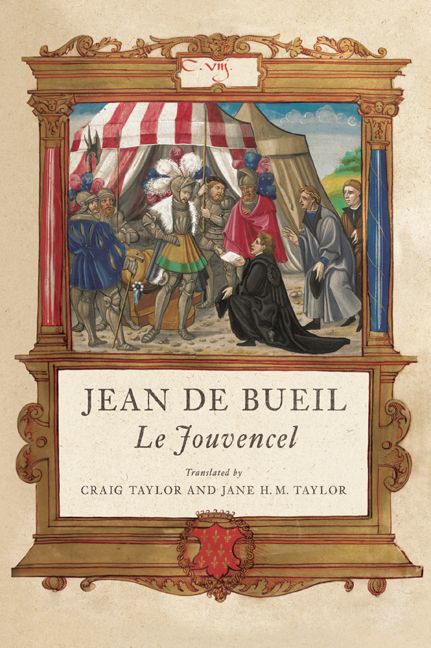Table of rubrics
Published online by Cambridge University Press: 06 October 2020
Summary
[123] Here there begins the table of this present book, entitled Le Jouvencel; it is newly composed and compiled by a wise and honourable knight, to inspire courage and bravery in all young men who are ready and eager to embrace the honourable style and exercise of arms – through which exercise he who is expert and acts uprightly and justly can ensure his own salvation. This book is divided into three main parts, thus mirroring the three ways of life prescribed by moral philosophy as set out by Nicole Oresme in his translation of Aristotle's Ethics: the three sciences, personal (or monostic), economic, and political.
Part I
The first part, the personal, speaks of the conduct of the individual; the second, the economic, of the conduct of the individual in relation to his family and his household; the third, the political, of the conduct proper to princes and captains who are charged with the governance of countries and peoples. And each of these three parts is divided into chapters, as follows.
The first chapter of the first part, that relating to the individual, explains how the wise knight who is the author of the present work dedicates it to God and to His saints, and explains when he embarked on this book. It tells how the knight, while on an obligatory journey, passed under safe-conduct through a particular country which had been ravaged and devastated by war; in this country there were a number of rather dilapidated castles and fortresses, among which two, one called Luc and the other Verset, had long been at enmity with each other.
Chapter 2 describes the way of life of the inhabitants of Luc, and recounts how the knight spent some time in the castle to study their behaviour and the ways in which they pursued their feats of arms [124]. Among the inhabitants was an impoverished young gentleman who in spite of his noble bearing was poorly dressed and had no horse – not even an ass – so was obliged to go on foot; in time, however, his valour and his wisdom would lead him to achieve honour and lordship.
- Type
- Chapter
- Information
- Jean de Bueil: Le Jouvencel , pp. 21 - 34Publisher: Boydell & BrewerPrint publication year: 2020



